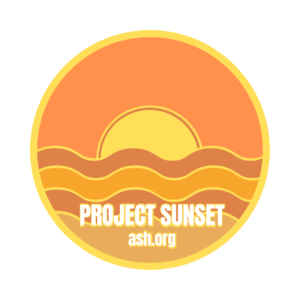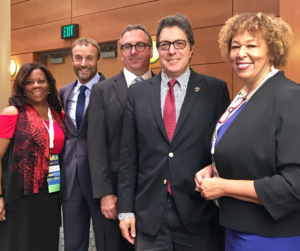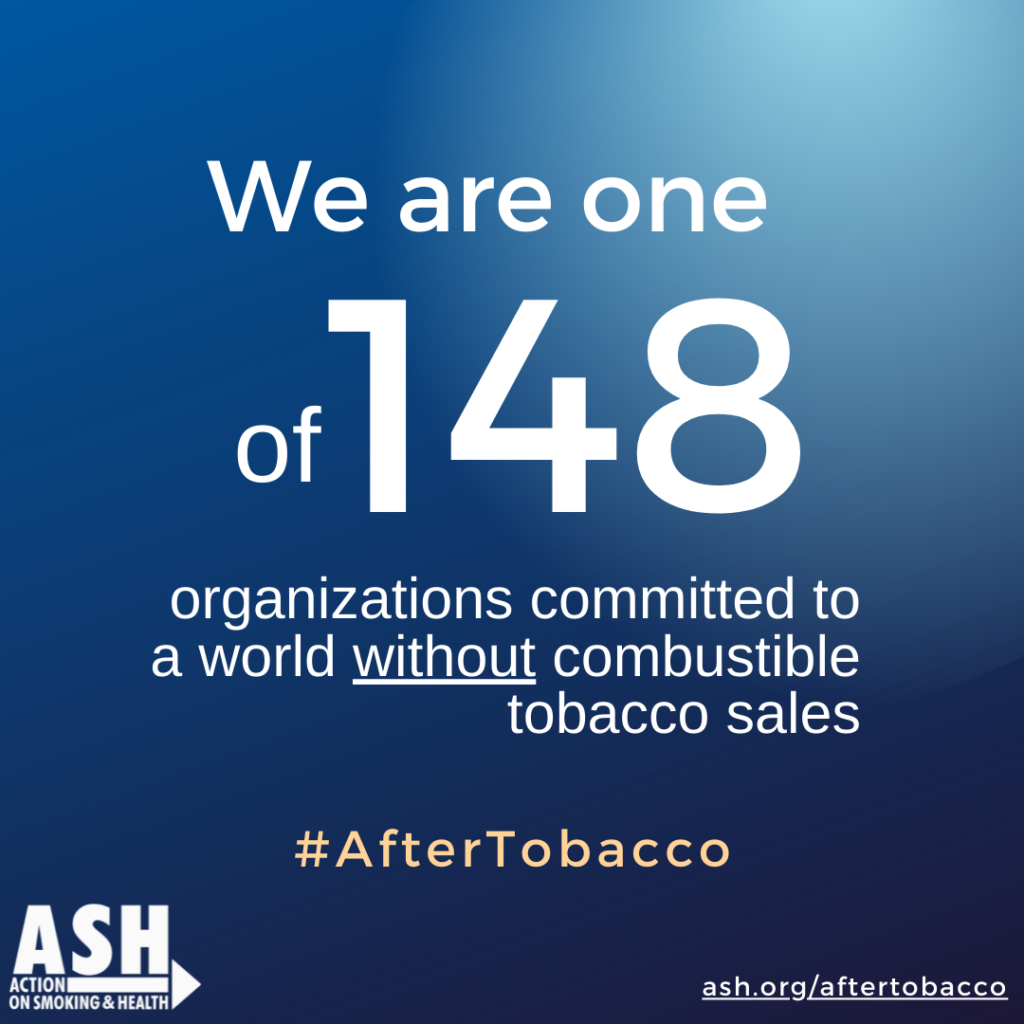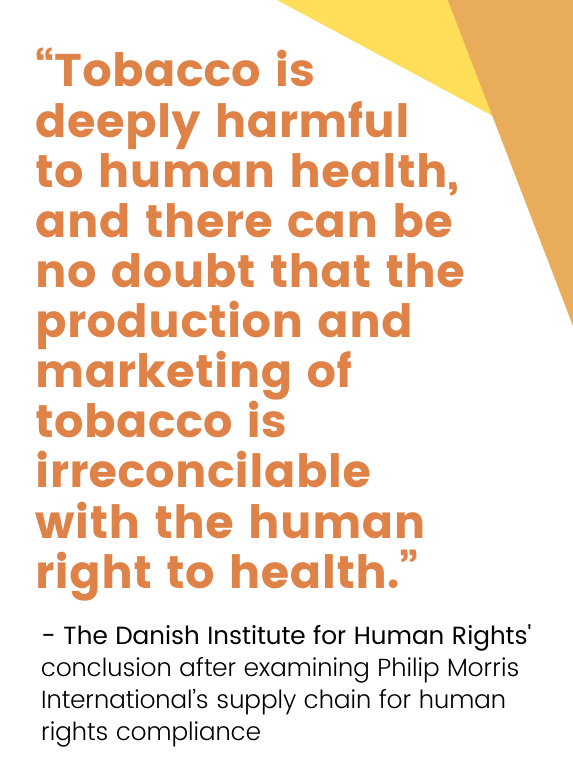[vc_row][vc_column][/vc_column][/vc_row][vc_row][vc_column][vc_column_text] Project Sunset is an ASH-led global campaign to convince policy makers to phase out the sale of commercial combustible tobacco products. It is focused entirely on the sale, not individual possession or use. The campaign includes efforts to address the social, political, and structural factors that sustain the smoking epidemic, in order to end it within a specified time period. Project Sunset reframes the conversation away from controlling death and disease to eliminating it.
Project Sunset is an ASH-led global campaign to convince policy makers to phase out the sale of commercial combustible tobacco products. It is focused entirely on the sale, not individual possession or use. The campaign includes efforts to address the social, political, and structural factors that sustain the smoking epidemic, in order to end it within a specified time period. Project Sunset reframes the conversation away from controlling death and disease to eliminating it.
The qualifier “commercial” is to allow for limited sales of tobacco products for sacred use, especially among American Indians who have considered tobacco spiritual and medicinal for many centuries. The name “Project Sunset” is derived from a tobacco industry scheme in the 1990s to renormalize smoking, which they called “Project Sunrise.”
Project Sunset is grounded in the understanding that the tobacco epidemic is caused by the actions of the tobacco industry. Nicotine is highly addictive, and cigarettes and other products have been engineered to be as addictive as possible. The majority of tobacco users became addicted as children, when consent was impossible. It is in part for this reason that the campaign is focused entirely on the tobacco industry and its products, not individual possession or use. Governments have a human rights obligation when enacting endgame policies to ensure access to cessation resources and support for tobacco users.
Project Sunset is focused on combustible tobacco, because that is the form of tobacco use that does nearly all of the damage to health in most countries. Depending on national or local contexts, policy makers may want to include smokeless and/or electronic nicotine delivery devices (ENDS) in their sales ban. There is a debate within the public health community on the reaction to ENDS; ASH’s stance is that we must not allow this debate to keep us from addressing the products that we all agree kill when used as intended.

There are a few “cardinal rules” for jurisdictions wishing to implement Project Sunset. The first is a phase-in period. This is to allow people who smoke time to quit, and for retailers to adjust their business models. The phase-out period will necessarily vary depending on the jurisdiction. In the two U.S. cities that have passed Sunset-style ordinances, smoking prevalence was already below 9%; consequently, their phase out periods ranged from 12 to 18 months. In jurisdictions with high prevalence, stronger implementation of measures included in the WHO Framework Convention on Tobacco Control are vital to reduce demand in preparation for Project Sunset. The second rule follows from the first – governments have an obligation to aid in cessation and to assist small retailers. Finally, ASH does not condone bans on possession or use.
Click here to learn more
about global progress>
ASH has formed U.S. and global steering committees of experts to guide our work on Project Sunset. There is also a separate but parallel effort in the state of California, and ASH sits on the state advisory committee.

There have been other “endgame” efforts in tobacco control over the past 15-20 years, but Project Sunset is different in that it is focused on the goal of ending sales. Past endgame conferences and research have focused on determining the best policies to end the tobacco epidemic, but we recognize that there are a number of potential paths to ending sales available to a government with the political will to consider Project Sunset. No “one size fits all” Sunset policy or set of policies will be appropriate for every jurisdiction. A number of supply-side interventions have been suggested, from continuously raising the age of purchase to gradually restricting retailer licensing to zero. The key is to put forward a plan that envisions the end of the tobacco epidemic, not merely a reduction in death and disease, while the tobacco industry continues to be permitted its deadly trade.
There is no inherent right for the tobacco industry to continue to be permitted to sell its deadly products. As the Danish Institute for Human Rights concluded, “there can be no doubt that the production and marketing of tobacco is irreconcilable with the human right to health.” Put simply, selling a consumer product that is both addictive and deadly is unacceptable and must be stopped.
 National Steering Committee*
National Steering Committee*
Anthony Billoni, Roswell Park Cancer Institute
Doug Blanke, Former Director, Public Health Law Center
Chris Bostic, Action on Smoking and Health
Lauren Czaplicki, Johns Hopkins University Bloomberg School of Public Health
Dick Daynard, Public Health Advocacy Institute at Northeastern University
Stacey Gagosian, Truth Initiative
Tonia Hagaman, California Tobacco Control Program
Laurent Huber, Action on Smoking and Health
Andrew Hyland, Roswell Park Comprehensive Cancer Center
Jackie Kaslow, Native Star Foundation
Joelle Lester, Public Health Law Center at Mitchell Hamline School of Law
Ruth Malone, University of California – San Francisco
Andrew Mowery, Independent Consultant
Dr. Tim McAfee, Former Director, CDC Office on Smoking and Health
Carol McGruder, African American Tobacco Control Leadership Council
*Steering committee members serve in their individual capacities.
Read Frequently Asked Questions (FAQs) here>
[/vc_column_text][vc_video link=”https://www.youtube.com/watch?v=H54ZqBILOLc” el_width=”70″ align=”center”][vc_row_inner][vc_column_inner][vc_column_text]
[/vc_column_text][/vc_column_inner][/vc_row_inner][/vc_column][/vc_row][vc_row][vc_column width=”1/2″][vc_column_text]Contact us to learn more about how to begin implementing one of these policies in your local community: info@ash.org
Why this is NOT prohibition
Ending the commercial sale of combustible tobacco products is not the same as prohibition. It is analogous to the way jurisdictions are looking at cannabis “legalization” or “de- criminalization”. Like in jurisdictions that have decriminalized cannabis, no one will be arrested for carrying or using cigarettes (within legally prescribed limits) and police officers will not search individuals, cars, or homes on the suspicion of cigarette possession. The public would be free to grow their own tobacco, give it as gifts, and even bring it in from other places.
In jurisdictions that have or are considering “legalizing” cannabis, no one is in favor of selling cannabis as a typical consumer good or making it available in convenience stores, gas stations, and the typical retail environment. Ending the commercial sales of cigarettes is not meant to make tobacco illegal, it is merely a rational response to the damage caused by the current extensive availability of cigarettes. Read full FAQs here>
There is No Legal “Right” to Smoke
The Focus is Cigarettes
Our focus is to phase out the sale of highly-engineered cigarettes. We oppose criminalizing their possession or use, always bringing the focus back to the tobacco industry and their marketing, mass distribution, and sale of a deadly product.
Tobacco plants themselves have additional uses currently being explored, such as vaccines (providing an outlet for tobacco farmers who don’t switch to a more profitable crop). Read more here.
Key Resources
- Jon Berrick: Guidance for Introducing the Tobacco-Free Generation Policy, January 2025
- Truth Initiative: Gamechanger: Shifting from Tobacco Control to Ending the Industry’s Influence for Good, July 2023
- The Economic Effects of Cigarette Sales and Flavor Bans on Tobacco Retail Businesses, June 2023
- Drawing on Adolescent Psychology to Achieve Tobacco-Free Generations, August 2022
- Going Beyond the World Health Organization Framework Convention on Tobacco Control: An Environmental Scan
- It is time for governments to support retailers in the transition to a smoke‐free society (more new from Australia, November 2021)
- White Paper: The Evidence for the Endgame by UpEnd Tobacco
- “Why ban the sale of cigarettes? The case for abolition” by Robert Proctor
- “The tobacco ‘endgame’: Is it possible?” by Eduardo Bianco
- Malone & Smith: An argument for phasing out the sale of cigarettes
- A new study shows that if pharmacies didn’t sell cigarettes, fewer people would smoke.
- A complete ban on the sale of cigarettes within 10 years, with smoking cessation support — is favoured by 44 per cent of smokers surveyed in Canada.
- U.S. Cessation Policy Guide from ALA
Sign up below to get involved.
[/vc_column_text][/vc_column][vc_column width=”1/2″][vc_column_text]
Related News
- Guernsey public supports increasing restrictions on smoking [and sale]
- Oregon Health Authority – retail pilot program to replace tobacco products with fruit and vegetables – August 2024
- Stop & Shop will stop selling all cigarettes and tobacco products at its 360 stores – August 2024
- Malta: Eleven organisations welcome talk of banning cigarettes for future generations – November 2023
- US CDC Research Brief: Support for Policies to Prohibit the Sale of Menthol Cigarettes and All Tobacco Products Among Adults, 2021 – February 2023
- 93% Pakistanis are of the opinion that the sale of cigarettes should be banned: Gallup & Gilani Pakistan – January 2023
- Inside the international fight to eliminate commercial tobacco sales – Fall/Winter 2022 issue of Hopkins Bloomberg Public Health magazine
- Progress, challenges and the need to set concrete goals in the global tobacco endgame – Pan American Journal of Public Health, October 2022
- Time for tobacco-free generations in the Western Pacific? – July 2022, The Lancet
- Public Views on “Tobacco Endgame” in Ireland – May 2022
- Action Plan and Resources for Smokefree Aotearoa 2025
- Australian governments urged to set a date to ban cigarette retail sales (November 2021)
- Netherlands grocery store stops selling cigarettes and tobacco (October 2021)
- New Zealand aims to create smoke-free generation
- Editorial: ‘Commit to quit’: a goal for all, not only individual tobacco users
- Counter Tobacco Podcast on Tobacco Endgame
- April 2021 Bloomington, MN: Sunsetting Retail Licenses
- Dolgeville, NY: Retail Environment Tobacco Law
- Brookline, MA: Tobacco-Free Generation
- Why Tasmanian retailers stop selling tobacco and implications for tobacco control (August 2020)
- New England grocery chain Hannaford to stop selling tobacco products
- Tobacco industry and public health responses to state and local efforts to end tobacco sales from 1969-2020
- Support for Aggressive Tobacco Control Interventions Among California Adolescents and Young Adults
- Another Voice: Smoking should be declared a public health emergency
- Unplanned purchasing of tobacco products
- Over 100 towns in Sri Lanka stop cigarette sales
- Store in New Zealand stops selling tobacco to protect its staff and its community
- UK Priest Neil McNicholas: Only answer to health threat is no smoking at all
- Tobacco Free Generation in Tasmania
- Tobacco Free Generation details
- Erie County, NY: Editorial: Ban tobacco sales in drugstores and As tobacco disappears from shelves, local smokers shrug: ‘I’m supposed to be quitting anyway.’
- Let’s Get Rid of Cigarettes
- A NJ bill would ban menthol cigarettes. It doesn’t go far enough
- Plain packets help smokers quit by killing brand identities
- The Real Cost of Smoking by State
- Evaluating the impact and equity of a tobacco-free pharmacy law on retailer density in New York City neighbourhoods
Expert Talks at ASH’s National Conference on Tobacco or Health 2019 (NCTOH) Booth
- Beverly Hills Mayor John Mirisch discusses how they became the 1st U.S. jurisdiction to phase out tobacco sales. Review his powerpoint slides here.
- Dr. Harry Lando of the University of Minnesota discusses tobacco as a human rights violation. Review his powerpoint slides here.
- Laurent Huber of Action on Smoking and Health discusses the intersection of the tobacco control and human rights fields. Review his powerpoint slides here.
- Overview of Project Sunset at NCTOH: Setting the Sun on Big Tobacco
[/vc_column_text][/vc_column][/vc_row][vc_row][vc_column][vc_column_text]
[/vc_column_text][/vc_column][/vc_row]